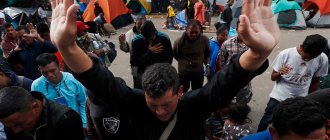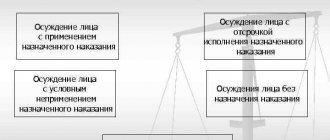Legal framework for countering extremism and terrorism"
Currently, the problem of terrorism and extremism remains one of the most serious for the international community, and the fight against extremist and terrorist groups is among the most pressing tasks of modern society.
The concept of extremism, or extremist activity, includes the promotion of racial, ethnic and religious conflicts using methods of aggressive and illegal influence, as well as violation of the rights, freedoms and legitimate interests of a person and citizen, depending on his racial, national, religious or social affiliation. Extremist activity is expressed in various forms of civil disobedience, including terrorist acts directed against government bodies and representatives of government agencies, as well as civilians. Thus, terrorism is one of the manifestations of extremism, a form of political struggle associated with the use of ideologically motivated violence.
The legal basis for countering extremist activities is legal support in the field of combating extremist activities. The legal basis for countering extremist activity is enshrined not only in the Federal Law
dated July 25, 2002 No. 114-FZ “On countering extremist activities,” but also in other legislation. First of all, it is necessary to name the Constitution of the Russian Federation, which provides for the equality of all before the law and the court, the right to life, the right to freedom of movement, freedom to determine nationality and use one’s native language, freedom of conscience and religion, active and passive voting rights. In essence, extremist activity is aimed at violating most of the norms provided for in Chapter. 1 and 2 of the Constitution of the Russian Federation.
Criminal Code of the Russian Federation in Art. 205.2, 280, 280.1, 282, 282.1, 282.2 provide for criminal liability, respectively, for public calls for terrorist activities or public justification of terrorism, public calls for actions aimed at violating the territorial integrity of the Russian Federation, public calls for extremist activities, incitement to hatred or hostility, as well as humiliation of human dignity, organization of an extremist community, organization of the activities of an extremist organization. A number of other provisions of the criminal law also determine liability for committing certain forms of extremist activity, in particular for financing extremist activity (Article 282.3 of the Criminal Code of the Russian Federation).
Code of the Russian Federation on Administrative Offenses in Ch. 5, 17, 19, art. 13.15, 15.27, 15.27.1, 20.28, 20.29 also contains many norms aimed at combating individual manifestations of extremist activity.
A significant part of the provisions of the Federal Law of July 25, 2002 No. 114-FZ “On Combating Extremist Activities” is also aimed at establishing the responsibility of various entities for carrying out extremist activities. These include:
- Article 9 “Responsibility of public and religious associations and other organizations for carrying out extremist activities”;
- Article 11 “Responsibility of the media for the dissemination of extremist materials and carrying out extremist activities”;
- Article 13 “Responsibility for the dissemination of extremist materials”;
- Article 14 “Responsibility of officials, state and municipal employees for their implementation of extremist activities”;
- Article 15 “Responsibility of citizens of the Russian Federation, foreign citizens and stateless persons for carrying out extremist activities.”
Indirectly, the provisions of Art. 6 - 8, 10, 12, 16 of the specified Federal Law.
The legal basis for countering extremist activities also consists of other federal legislation, regulations, as well as international acts, in particular:
- European Convention for the Suppression of Terrorism (Strasbourg, 27 January 1977) (ETS No. 90);
- Shanghai Convention on Combating Terrorism, Separatism and Extremism (concluded in Shanghai on June 15, 2001);
- Treaty on cooperation between member states of the Commonwealth of Independent States in the fight against terrorism (Minsk, June 4, 1999);
- International Convention on the Elimination of All Forms of Racial Discrimination (adopted on December 21, 1965 by Resolution 2106 (XX) of the UN General Assembly);
- Universal Declaration of Human Rights (adopted by the UN General Assembly on December 10, 1948);
- “Strategy for countering extremism in the Russian Federation until 2025”;
- Federal Law of March 6, 2006 N 35-FZ “On Countering Terrorism”;
- Federal Law of May 19, 1995 N 80-FZ “On the perpetuation of the Victory of the Soviet people in the Great Patriotic War of 1941-1945”;
- Federal Law of December 28, 2010 N 390-FZ “On Security”;
- Federal Law of August 7, 2001 N 115-FZ “On combating the legalization (laundering) of proceeds from crime and the financing of terrorism”;
- Decree of the President of the Russian Federation of March 23, 1995 N 310 “On measures to ensure coordinated actions of government bodies in the fight against manifestations of fascism and other forms of political extremism in the Russian Federation”;
- Concept of countering terrorism in the Russian Federation (approved by the President of the Russian Federation on October 05, 2009);
- Decree of the President of the Russian Federation dated July 26, 2011 N 988 “On the Interdepartmental Commission to Counter Extremism in the Russian Federation” (together with the “Regulations on the Interdepartmental Commission to Counter Extremism in the Russian Federation”);
- Order of the Ministry of Justice of the Russian Federation, the Ministry of Internal Affairs of the Russian Federation and the FSB of the Russian Federation dated November 25, 2010 N 362/810/584 “On the interaction of the Ministry of Justice of the Russian Federation, the Ministry of Internal Affairs of the Russian Federation and the Federal Security Service of the Russian Federation in order to increase the efficiency of the activities of institutions (divisions), carrying out research and examinations on cases related to extremism”;
- Order of the Ministry of Justice of the Russian Federation dated July 22, 2009 N 224 “On approval of the Regulations on the Scientific Advisory Council under the Ministry of Justice of the Russian Federation for the study of information materials of religious content to identify signs of extremism in them”;
- Order of the Investigative Committee of the Russian Federation dated July 12, 2011 N 109 “On measures to counter extremist activities”;
- Order of the Prosecutor General's Office of Russia dated March 21, 2018 N 156 “On the organization of prosecutorial supervision over the implementation of laws on countering extremist activities”
- Order of the Prosecutor General's Office of Russia dated August 2, 2018 N 471 “On the organization of work on legal education and legal information in the prosecutor's office of the Russian Federation”
- Order of the Prosecutor General's Office of the Russian Federation N 270/27r, Ministry of Internal Affairs of the Russian Federation N 1/9789, FSB of the Russian Federation N 38 of December 16, 2008 “On improving the work to prevent and suppress the activities of public and religious associations to spread the ideas of national hatred and religious extremism”;
- Resolution of the Plenum of the Supreme Court of the Russian Federation dated June 28, 2011 No. 11 “On judicial practice in criminal cases involving extremist crimes.”
- Certain rules related to countering extremism in a specific field of activity or within the framework of certain issues within the competence of specific bodies are also contained in other legislation, for example:
- Federal Law of June 19, 2004 N 54-FZ “On meetings, rallies, demonstrations, processions and picketing”;
- Federal Law of May 19, 1995 N 82-FZ “On Public Associations”;
- Federal Law of September 26, 1997 N 125-FZ “On Freedom of Conscience and Religious Associations”;
- Federal Law of July 11, 2001 N 95-FZ (as amended on July 3, 2018) “On Political Parties”;
- Federal Law of January 17, 1992 N 2202-1 (as amended on April 18, 2018) “On the Prosecutor’s Office of the Russian Federation”;
- Federal Law of October 6, 2003 N 131-FZ “On the general principles of organizing local self-government in the Russian Federation”;
- Decree of the President of the Russian Federation dated March 1, 2011 N 248 “Issues of the Ministry of Internal Affairs of the Russian Federation”;
- Decree of the President of the Russian Federation dated August 11, 2003 N 960 “Issues of the Federal Security Service of the Russian Federation”;
- Decree of the President of the Russian Federation dated March 1, 2011 N 250 “Issues of police organization”;
Decree of the President of the Russian Federation dated October 13, 2004 N 1313 “Issues of the Ministry of Justice of the Russian Federation”
Responsibility for extremist and terrorist crimes
- Responsibility for extremist crimes
The Criminal Code of the Russian Federation provides for liability for committing crimes such as organizing an extremist community (Article 282.1) and organizing the activities of an extremist organization (Article 282.2).
The organization of an extremist community is the creation of a public or religious association or other organization with the goal of preparing or committing a crime (one or more) of an extremist nature.
What is an extremist crime? According to a number of legal researchers, these are acts committed based on political, ideological, racial, national or religious hatred or enmity against any social group, provided for in the relevant articles of the Special Part of the Criminal Code of the Russian Federation.
The sanction of Article 282.1 of the Criminal Code of the Russian Federation provides for criminal liability both for the creation of an extremist community by a person and for participation in it. Creation of an extremist community, that is, an organized group of persons for preparing or committing crimes of an extremist nature, as well as the leadership of such an extremist community, its part or structural units included in such a community, as well as the creation of an association of organizers, leaders or other representatives of parts or structural units of such a community in order to develop plans and (or) conditions for committing crimes of an extremist nature - is punishable by a fine in the amount of two hundred thousand to five hundred thousand rubles or in the amount of wages or other income of the convicted person for a period of eighteen months to three years, or by forced labor for a term of up to five years with restriction of freedom for a term of one to two years, or imprisonment for a term of two to eight years with deprivation of the right to hold certain positions or engage in certain activities for a term of up to ten years and with restriction of freedom for a term of one to two years years.
Inducing, recruiting or otherwise involving a person in the activities of an extremist community is punishable by a fine in the amount of one hundred thousand to three hundred thousand rubles or in the amount of the wages or other income of the convicted person for a period of one to two years, or by forced labor for a period of one to two years. five years with restriction of freedom for a term of one to two years, or imprisonment for a term of one to six years with restriction of freedom for a term of one to two years.
Participation in the activities of such communities is punishable by a fine in the amount of up to one hundred thousand rubles or in the amount of the wages or other income of the convicted person for a period of up to one year, or by forced labor for a period of up to three years with deprivation of the right to hold certain positions or engage in certain activities for a period of up to three. years or without it and with restriction of freedom for a term of up to one year, or imprisonment for a term of up to four years with deprivation of the right to hold certain positions or engage in certain activities for a term of up to five years, or without it and with restriction of freedom for a term of up to one year.
Severe punishment is provided for persons who used their official position when participating in an organization or its creation. In accordance with Part 3 of Art. 282.1, these acts are punishable by a fine in the amount of three hundred thousand to seven hundred thousand rubles or in the amount of wages or other income of the convicted person for a period of two to three years, or by forced labor for a term of up to five years with deprivation of the right to hold certain positions or engage in certain activities for a term of up to three years or without it and with restriction of freedom for a term of one to two years, or imprisonment for a term of four to ten years with deprivation of the right to hold certain positions or engage in certain activities for a term of up to ten years or without it and with restriction of freedom for a period of one to two years.
Organizing the activities of a public or religious association or other organization in respect of which the court has made a decision to liquidate or ban its activities that has entered into legal force in connection with the implementation of extremist activities, with the exception of organizations that, in accordance with the legislation of the Russian Federation, are recognized as terrorist, is punishable by a fine of in the amount of three hundred thousand to five hundred thousand rubles or in the amount of wages or other income of the convicted person for a period of two to three years, or forced labor for a term of up to five years with or without restriction of freedom for a term of up to two years, or arrest for a term of four to six months, or imprisonment for a term of two to eight years with or without deprivation of the right to hold certain positions or engage in certain activities for a term of up to ten years and with or without restriction of freedom for a term of up to two years.
Inducing, recruiting or otherwise involving a person in the activities of an extremist organization is punishable by a fine in the amount of one hundred thousand to three hundred thousand rubles or in the amount of the wages or other income of the convicted person for a period of one to two years, or by forced labor for a period of one to two years. five years with restriction of freedom for a term of one to two years, or imprisonment for a term of two to six years with restriction of freedom for a term of one to two years.
Participation in the activities of a public or religious association or other organization in respect of which a court has made a final decision to liquidate or prohibit activities in connection with the implementation of extremist activities, with the exception of organizations that are recognized as terrorist in accordance with the legislation of the Russian Federation, is punishable by a fine. in the amount of up to three hundred thousand rubles or in the amount of wages or other income of the convicted person for a period of up to two years, or by forced labor for a period of up to three years with or without restriction of freedom for a term of up to one year, or by arrest for a term of up to four months, or imprisonment for a term of up to four years with deprivation of the right to hold certain positions or engage in certain activities for a term of up to five years or without it and with restriction of freedom for a term of up to one year or without it.
These acts, committed by a person using his official position, are punishable by a fine in the amount of three hundred thousand to seven hundred thousand rubles or in the amount of the wages or other income of the convicted person for a period of two to three years, or by forced labor for a term of up to five years with imprisonment the right to occupy certain positions or engage in certain activities for a term of up to three years or without it and with restriction of freedom for a term of one to two years, or imprisonment for a term of up to seven years with deprivation of the right to occupy certain positions or engage in certain activities for a term of up to ten years or without it and with restriction of freedom for a period of one to two years.
A person who voluntarily ceased participation in the activities of a public or religious association or other organization in respect of which the court made a decision on liquidation or prohibition of activities that has entered into legal force in connection with the implementation of extremist activities, is exempt from criminal liability, unless his actions contain a different element. crimes.
It should be noted that while offenses take place, there remains a need for state law enforcement agencies to use coercive measures against offenders, because “law is nothing without an apparatus capable of enforcing compliance with the rules of law.” Young people upon reaching the legal age may be subject to both administrative and criminal liability.
The Code of Administrative Offenses of the Russian Federation contains two articles providing for liability for committing an offense of an extremist nature. These are Article 20.3 – “propaganda and public display of Nazi paraphernalia or symbols or public display of paraphernalia or symbols of extremist organizations” and Article 20.29 – “production and distribution of extremist materials”.
At the same time, the Code of Administrative Offenses of the Russian Federation provides for liability for other illegal actions, which may also be of an extremist nature or stem from extremist motives. These include: violation of legislation on freedom of conscience, freedom of religion and religious associations (Article 5.26); violation of the procedure for the official use of state symbols of the Russian Federation (Article 17.10); petty hooliganism (Article 20.1); violation of the established procedure for organizing or holding a meeting, meeting, demonstration, procession or picketing (Article 20.2).
Criminal liability is provided for the commission of unlawful acts of an extremist nature, which include crimes committed on the grounds of political, ideological, racial, national or religious hatred or enmity, or on grounds of hatred or enmity against any social group (Article 105 - murder ; Article 111 – intentional infliction of grievous bodily harm; Article 112 – intentional infliction of moderate harm to health; Article 115 – intentional infliction of minor bodily harm; Article 116 – beatings; Article 117 – torture; Article 119 – threat of murder or infliction of grievous bodily harm; Article 136 – violation of equality of rights and freedoms of man and citizen; Article 148 – obstruction of the exercise of the right to freedom of conscience and religion; Article 149 – obstruction of an assembly, rally, demonstration, procession, picketing or participation in them; Article 150 – involvement of a minor in committing crimes; Article 212 – mass riots; Article 213 – hooliganism; Article 214 – vandalism; Article 239 – creation of a non-profit organization that infringes on the personality and rights of citizens; Article 243 – destruction or damage to cultural heritage sites; Article 244 – desecration of the bodies of the dead and their burial places; Article 280 – public calls for extremist activities; Article 281 – sabotage; Article 282 – incitement to hatred or enmity, as well as humiliation of human dignity; Article 282.1 – organization of an extremist community; Article 282.2 – organizing the activities of an extremist organization; Article 335 – violation of the statutory rules of relations between military personnel in the absence of a relationship of subordination between them; Article 336 – insult to a military serviceman; Article 357 – genocide).
Responsibility for terrorist crimes
For the first time, liability for terrorism was introduced by the Federal Law of the Russian Federation of July 1, 1994. This is a multi-objective crime, since it encroaches on the life and health of citizens, property, public safety and the normal functioning of government bodies. The terrifying impact of terrorism is often addressed to a wide and sometimes indefinite circle of people, even to the population of entire cities and administrative districts or microdistricts, as well as to specific officials and authorities vested with the right to make organizational, managerial, judicial or other decisions.
The specified impact can be addressed to religious, political, public figures, and cultural figures; based on the desired reaction, it can be carried out in relation to representatives of the business community, persons engaged in production and trade, in relation to members of other criminal organizations. Thus, terrorism is now quite often used in extortion, although it is not always officially recorded in this capacity.
The inclusion of a special crime - terrorism - in the criminal code represents a significant step forward in the more effective use of criminal law in the fight against such a dangerous crime.
Until 1994, criminal liability was provided only for the murder of a state or public figure or representative of government in connection with his state or public activities, with the aim of undermining or weakening Soviet power, or for causing grievous bodily harm to the same persons, as well as for the murder of a representative of a foreign state , with the aim of provoking war or international complications, or for causing grievous bodily harm to the same persons for the same purpose.
A terrorist act according to the Criminal Code of the Russian Federation is the commission of an explosion, arson or other actions that frighten the population and create a danger of death, causing significant property damage or other grave consequences, in order to destabilize the activities of authorities or international organizations or influence their decision-making, and also the threat of committing the specified actions for the same purposes is punishable by imprisonment for a term of eight to fifteen years (Part 1, Article 205 of the Criminal Code of the Russian Federation).
The same acts: committed by a group of persons by prior conspiracy or by an organized group; resulting in the death of a person through negligence; entailing the infliction of significant property damage or the onset of other grave consequences - are punishable by imprisonment for a term of ten to twenty years with restriction of freedom for a term of one to two years (Part 2 of Article 205 of the Criminal Code of the Russian Federation).
Acts provided for in parts one or two of Article 205 of the Criminal Code of the Russian Federation, if they: involve an encroachment on nuclear energy facilities or the use of nuclear materials, radioactive substances or sources of radioactive radiation or poisonous, poisonous, toxic, dangerous chemical or biological substances; entailed the intentional infliction of death on a person, is punishable by imprisonment for a term of fifteen to twenty years, with restriction of freedom for a term of one to two years, or life imprisonment.
Art. 205, Part 1 of the Criminal Code of the Russian Federation consists of two parts: the first lists those actions that create “the danger of death, causing significant property damage, or the occurrence of other socially dangerous consequences”; the second contains an indication of the threat of committing these actions. This is the second form of terrorism. Its reality is determined by whether the threat is capable of causing fear in an individual, group of people or authorities that it will be carried out, and the damage that will be caused by certain actions is significant. And here intimidation must operate, and the threat itself can be expressed orally, in writing or in another way, in particular using modern technical means of communication. It does not matter whether the threat was made openly or anonymously, to a wide range of people or to one person, such as a government employee, over the telephone.
The subject of terrorism can be any sane person who has reached the age of fourteen. This provision in relation to the crime in question is especially relevant, since, as practice shows, quite a lot of teenagers take part in national and religious terrorism. In conditions of mass hysteria, due to their age, they can easily fall under the influence of adults and commit criminal acts. Subjects of terrorism can be citizens of the Russian Federation, foreigners and stateless persons.
The commission of grave or especially grave crimes is not a distinctive feature of criminal communities (criminal organizations), since such crimes can also be committed by groups of other types. The main distinguishing feature of a criminal community (criminal organization) is the scale of actions, duration of operation, organization, well-established control mechanism, camouflage, even deep secrecy, elusiveness, the ability to influence major social, political, economic decisions, close connections, sometimes underground, with government, political, public, financial organizations and their figures.
The subjective side of terrorism, which through negligence has resulted in the death of a person or other grave consequences, is characterized by a double form of guilt: direct intent in relation to terrorist actions and carelessness (both frivolity and negligence) in relation to those specified in paragraph 3 of Art. 205 consequences. Naturally, minor damage can also be caused carelessly - in this case, liability arises under Part 1 or Part 2 of Art. 205 of the Criminal Code of the Russian Federation.
Covering the criminal legal aspect of the fight against terrorism, one cannot help but pay attention to such an issue as liability for knowingly false reporting of an act of terrorism (Article 207 of the Criminal Code of the Russian Federation). Terrorism leads to destabilization in society, creates an atmosphere of fear, and disrupts the activities of enterprises, organizations and institutions. This phenomenon has also given rise to “jokers” – people who make false reports about the preparation of an act of terrorism. Such actions are not isolated. They are constantly reported in the media. Knowingly false information about an impending explosion, arson or other actions that create a danger of death, causing significant property damage or other socially dangerous consequences is punishable by a fine of up to two hundred thousand rubles or in the amount of wages wages or other income of the convicted person for a period of up to eighteen months, or compulsory work for a term of up to four hundred eighty hours, or correctional labor for a period of one to two years, or restriction of freedom for a term of up to three years, or forced labor for a term of up to three years , or arrest for a term of three to six months, or imprisonment for a term of up to three years. The same act, which entailed the infliction of large damage or the onset of other grave consequences, is punishable by a fine in the amount of up to one million rubles or in the amount of the wages or other income of the convicted person for a period of eighteen months to three years, or by imprisonment for a term of up to five years. In this article, major damage is defined as damage the amount of which exceeds one million rubles.
Prosecutor's office
September 5, 2022
Criminal and administrative liability for actions of an extremist and terrorist nature.
In recent years, there has been a steady increase in extremist crimes in the Russian Federation. Despite the efforts made by law enforcement agencies, extremism continues to pose a serious threat to stability and public safety in our country.
Extremism is a commitment to extreme views, positions and measures in public activities, expressed in various forms, ranging from manifestations that do not go beyond the constitutional framework, and ending with such acute and socially dangerous forms as provoking riots, civil disobedience, rebellion, insurgent activity , terrorist acts. Extremism is a broader concept because terrorist acts and terrorism are only one form of extremism.
Criminal, administrative and civil liability is provided for carrying out extremist activities.
Crimes of an extremist nature are:
1) Article 280 of the Criminal Code of the Russian Federation - public calls for extremist activities;
2) Article 282 of the Criminal Code of the Russian Federation - incitement to hatred or enmity, as well as humiliation of human dignity;
3) Article 282.1 of the Criminal Code of the Russian Federation - organization of an extremist community;
4) Article 282.2 of the Criminal Code of the Russian Federation - organizing the activities of an extremist organization.
The Code of Administrative Offenses of the Russian Federation contains three articles that provide for liability for committing an offense of an extremist nature. These are Article 20.3 - propaganda and public display of Nazi paraphernalia or symbols, Article 20.29 - production and distribution of extremist materials and 20.3.1 - incitement of hatred or enmity, as well as humiliation of human dignity, if these actions do not contain a criminal offense.
At the same time, the Code of Administrative Offenses of the Russian Federation provides for liability for other illegal actions, which may also be of an extremist nature or stem from extremist motives. These include: violation of legislation on freedom of conscience, freedom of religion and religious associations (Article 5.26); illegal actions in relation to state symbols of the Russian Federation (Article 17.10); petty hooliganism (Article 20.1); violation of the established procedure for organizing or holding a meeting, meeting, demonstration, procession or picketing (Article 20.2); organizing the activities of a public or religious association in respect of which a decision has been made to suspend its activities (Article 20.2(1)).
Criminal liability for committing crimes of an extremist and terrorist nature:
| Article of the Criminal Code of the Russian Federation | Maximum term (size) of punishment |
| Art. 205Terrorist act | Life imprisonment |
| Art. 205.1 Promotion of terrorist activities | Life imprisonment |
| Art. 205.2 Public calls for terrorist activities or public justification of terrorism | imprisonment up to five years |
| Art. 205.3 Undertaking training for the purpose of carrying out terrorist activities | shall be punishable by imprisonment for a term of fifteen to twenty years, with restriction of freedom for a term of one to two years, or life imprisonment. |
| Art. 205.4 Organization of a terrorist community and participation in it | imprisonment for a term of fifteen to twenty years with a fine in the amount of up to one million rubles or in the amount of wages or other income of the convicted person for a period of up to five years, or without it and with restriction of freedom for a term of one to two years or life imprisonment . |
| Art. 205.5 Organizing the activities of a terrorist organization and participating in the activities of such an organization | imprisonment for a term of fifteen to twenty years with a fine in the amount of up to one million rubles or in the amount of wages or other income of the convicted person for a period of up to five years, or without it and with restriction of freedom for a term of one to two years or life imprisonment . |
| Art. 206 Hostage taking | Life imprisonment |
| Art. 207 Knowingly false report of an act of terrorism | Imprisonment for up to ten years. |
| Art. 280 Public calls for extremist activities | Imprisonment for a term of up to five years with deprivation of the right to hold certain positions or engage in certain activities for a term of up to three years |
| Art. 280.1 Public calls for actions aimed at violating the territorial integrity of the Russian Federation | imprisonment for a term of five years with deprivation of the right to hold certain positions or engage in certain activities for a term of up to three years |
| Art. 282. Inciting hatred or enmity, as well as humiliation of human dignity | Imprisonment for up to six years. |
| Art. 282.1. Organization of an extremist community | Imprisonment for a term of up to twelve years with deprivation of the right to hold certain positions or engage in certain activities for a term of up to ten years and with restriction of freedom for a term of one to two years. |
| Art. 282.2. Organization of the activities of an extremist organization | Imprisonment for a term of up to twelve years with restriction of freedom for a term of up to ten years or without it and with restriction of freedom for a term of one to two years. |
On criminal liability for reporting knowingly false information about acts of terrorism and actions upon receiving an anonymous message about an explosive device planted at a voting place.
According to the current criminal legislation, a telephone message of knowingly false information about acts of terrorism is qualified as a knowingly false message about an act of terrorism, provided for in Article 207 of the Criminal Code of the Russian Federation, for which a penalty is provided in the form of a fine in the amount of two hundred thousand to five hundred thousand rubles or in the amount of wages or other income of the convicted person for a period of one year to eighteen months, or restriction of freedom for a term of up to three years, or forced labor for a period of two to three years.
At the same time, increased liability is provided for the commission of this crime in relation to social infrastructure facilities, which include educational and leisure institutions, namely, it is punishable by a fine in the amount of five hundred thousand to seven hundred thousand rubles or in the amount of wages or other income of the convicted person for the period from one year to two years or imprisonment for a term of three to five years.
This type of crime at the psychological level is associated with terrorism, since it disrupts the normal rhythm of life, creates an extreme situation, and diverts significant effort and resources to verify messages and take preventive measures to save people.
The false report does not concern a completed act of terrorism, but only an impending act of terrorism. It does not express an indispensable intention to implement it. In order to qualify such an act under the first part of Article 207 of the Criminal Code of the Russian Federation, it is quite sufficient to indicate in a false message about an impending explosion, arson or other action, which, due to the place, time, situation and other circumstances, is perceived by people and authorities as a real impending act of terrorism.
The recipients of false messages may be government bodies, as well as organizations, institutions, including media editorial offices, school directorates, etc., officials and citizens whose interests could be harmed as a result of an act of terrorism. In the latter case, the false report must be of a public nature, i.e. be done with the expectation not of concealment, but, on the contrary, of their dissemination.
It should also be noted that a false report about an intended threat (for example, someone expressed an intention to plant an explosive device) or about an allegedly already committed terrorist act does not constitute the crime in question. Such actions, in the presence of other relevant circumstances, may be qualified as a false denunciation (Article 306 of the Criminal Code of the Russian Federation).
The subject of the crime is a sane individual who has reached the age of 14. In the modern world, law enforcement agencies have the necessary resources to easily establish not only the owner and the phone number from which the bomb was reported, but also the location from which the call was made. Thus, the principle of inevitability of punishment and responsibility is realized.
Actions to take when receiving a telephone message about a threat of a terrorist attack.
Necessary:
- respond to every incoming phone call;
- try to let your colleague know about this threat; if possible, simultaneously with the conversation, he should inform the operational police officer on another device
- If you have an automatic caller ID (ANI), write down the identified telephone number in a notebook, which will avoid its accidental loss;
- when using sound recording equipment, record this conversation and immediately extract (save) the audio recording file and take measures to ensure its safety. It is imperative to ensure that the recording equipment is in working order;
- ensure unhindered transmission of information received by telephone to law enforcement agencies and the head of the organization;
- if necessary, evacuate persons in the organization according to the evacuation plan to a safe place;
- ensure the unhindered work of the operational investigation team, dog handlers, etc.
When receiving a telephone message about a bomb threat, be calm, polite, and do not interrupt the speaker. Refer to the poor quality of the device in order to record the conversation. Do not hang up the phone after finishing a call.
The following actions will greatly help law enforcement agencies in preventing crimes and searching for criminals.
Try to remember the conversation verbatim and record it on paper.
As the conversation progresses, note the gender, age of the caller and speech characteristics:
- voice: loud, (quiet), low (high);
— rate of speech: fast (slow);
- pronunciation: distinct, distorted, with a stutter, with a lisp with a stutter, with an accent or dialect;
- manner of speech: cheeky, mocking, with obscene expressions.
Be sure to note the sound background (the noise of cars or railway transport, the sounds of television or radio equipment, voices, etc.).
Note the nature of the call (local or long-distance).
Be sure to record the exact time the conversation started and its duration.
In any case, try to get answers to the following questions during the conversation:
- Where, to whom, what phone number is this person calling?
— What specific demands does he (she) put forward?
— Does he (she) make demands personally, act as an intermediary, or represent any group of people?
— On what conditions does he (she) or they agree to abandon the plan?
— How and when can I contact him (her)?
- Who can or should you inform about this call?
Try to get the caller to give the caller as much time as possible for you and your management to make decisions or take any action.
If possible, during the conversation, inform the head of the organization or his replacement about it, if not, immediately after it ends.
Rules of conduct when detecting suspicious objects that may turn out to be explosive devices.
— It is strictly forbidden to touch, open, move or take any other actions with the discovered item. — It is not recommended to use mobile phones and other radio communications near such an object. — You must immediately report the discovery of a suspicious item to the police or other competent authorities.
If you find an unknown item in an institution or organization: 1. Immediately notify the administration or security of the institution about the find. 2. Record the time and place of discovery of an unknown object. 3. Take measures to ensure that people move as far as possible from the suspicious object and danger zone. 4. Wait for representatives of the competent authorities to arrive, indicate the location of the suspicious item, the time and circumstances of its discovery. 5. Don't panic. Report a possible bomb threat only to those who need to know about it. It is also necessary to remember that the appearance of an item may hide its real purpose. The presence of an explosive device or other dangerous objects may be indicated by the following signs:
Signs of an explosive device:
— The presence of wires, small antennas, electrical tape, twine, rope, adhesive tape in the bag, or sticking out of the bag.
— Noise from detected suspicious objects (packages, bags, etc.). This could be a clock ticking, clicking, etc.
— The presence of batteries (batteries) on the found suspicious item.
— Streamers made of wire, rope, twine, fishing line;
— Unusual placement of the item;
— The presence of an object that is unusual for the area;
— A specific smell that is unusual for the area.
Rules of conduct in the event of a terrorist attack or hostage taking
- Unquestioningly comply with the demands of terrorists if they do not pose a threat to your life and health.
- Try to distract yourself from unpleasant thoughts.
- Inspect the place where you are, mark the shelter's escape routes.
- Try not to stand out in a group of hostages.
- If you need to get up or move to another place, ask permission.
- Try to keep yourself busy: reading, writing, etc.
- Don't drink alcohol.
- Hand over the personal items the terrorists demand.
- If you are among those released, provide the following information to representatives of the special services: the number of invaders, their location, weapons, the number of passengers, the moral and physical condition of the terrorists, the characteristics of their behavior, and other information.
- When shooting, lie down on the floor or take cover, but do not run anywhere.
- When using force to free hostages, strictly follow all orders from intelligence agencies.
Rules of conduct for victims.
If you are injured
- If there is capillary bleeding. Try to bandage the wound with a tourniquet, towel, scarf or piece of cloth.
- If there is venous bleeding. Apply a pressure bandage using a belt, scarf, or strip of strong fabric.
- Help someone who is nearby, but in a more difficult situation.
If you are under rubble
- Don't lose heart and don't panic.
- Look around to see if there are any voids nearby. Try to determine where the air is coming from.
- Try to signal by voice or knock. It’s better to do this when you hear people’s voices and dogs barking.
- As soon as the machines and mechanisms stop working and there is silence, a “minute of silence” is declared. At this time, rescuers with equipment and dogs are conducting intensive reconnaissance. Use this to get their attention in any way you can. You will be detected by moaning, screaming and even breathing.
If you're out of breath
- Put on a damp cotton gauze bandage.
- Protect your respiratory system with a wet towel, handkerchief, scarf or other cloth.
- If you smell gas, open the windows, do not use a lighter, matches, or turn on electrical appliances or lighting.
On the concept, essence and danger of extremism and terrorism
Extremism (from the Latin extremus - extreme) can be defined as the commitment of individuals or groups of individuals to extreme, radical views that relate to public life (usually its political sphere).
Examples of extremism include a violent change in the foundations of the constitutional system and violation of the integrity of Russia, public justification of terrorist actions, incitement of hatred of a social, racial, national or religious nature and other activities that threaten the security of society, as well as violate the rights and freedoms of many citizens, having a basis for there is a clear ideological basis for this.
The fight against extremism is regulated by the Federal Law “On Combating Extremist Activities” No. 114-FZ of July 25, 2002 and is carried out in two directions:
- carrying out preventive measures to prevent extremist activity;
- identification, prevention and suppression of extremism emanating from individuals and legal entities.
Terrorism (from the Latin terror - fear, horror) is the ideology of violence and the practice of influencing decision-making by organizations of the international community, government bodies, local governments, carried out through intimidation of the population and (or) through other forms of illegal violent actions.
The key element of terrorism is the fear that terrorists dispel in society through their sudden acts.
Federal Law “On Combating Terrorism” No. 35-FZ dated 03/06/2006 defines in detail all aspects of the fight against terrorism, which are aimed at both preventing and suppressing illegal actions.
To suppress a terrorist act, a counter-terrorism operation is carried out. In the territory where it is implemented, a special restrictive legal regime may be introduced for ordinary citizens in order to maintain security. An individual found guilty of carrying out terrorist activities bears criminal liability:
The concepts of “extremism” and “terrorism” are interrelated. Terrorism is an integral part of extremism, one of the types of its manifestations, directly related to violence or the threat of violence and the impact on the state. Extremism is broader: it also includes activities that are not violent, but still grossly violate the rights and freedoms of citizens, having ideological underpinnings (for example, a public knowingly false accusation of a person holding a public office).
Both terrorism and extremism presuppose a commitment to radical views and threats or practices of violence that discriminate against other people on any grounds and negatively impact society.
Extremism is aimed, first of all, at negative transformations of the political space (human sacrifices are not necessary here), while terrorism aims to destabilize the state of society as a whole.
Both extremism and terrorism are destructive social forces that negatively affect the consciousness of their adherents and interfere with the normal functioning of other people. It is much more difficult to counter these crimes than, for example, thefts or even murders, since the initial intent of extremism and terrorism lies in the idea of causing harm to as many people as possible and to society as a whole. Therefore, extremism and terrorism are not a purely personal matter of those people who have encountered this in life, but the matter of each of us.
In accordance with Article 15 of the Federal Law of July 25, 2002 No. 114-FZ “On Combating Extremist Activities,” citizens of Russia, foreign citizens and stateless persons bear criminal, administrative and civil liability in the manner prescribed by Russian legislation for carrying out extremist activities.
Article 20.3 of the Code of Administrative Offenses of the Russian Federation provides for administrative liability for propaganda or public display of Nazi paraphernalia or symbols, or paraphernalia or symbols that are confusingly similar to Nazi paraphernalia or symbols, paraphernalia or symbols of Nazi, extremist organizations, as well as other paraphernalia or symbols prohibited by federal laws, as well as for the production or sale for the purposes of propaganda or the acquisition for the purposes of sale or propaganda of the specified paraphernalia or symbols.
Article 20.29 of the Code of Administrative Offenses of the Russian Federation provides for administrative liability for the mass distribution of extremist materials included in the published federal list of extremist materials, as well as their production or storage for the purpose of mass distribution.
The Criminal Code of the Russian Federation, in particular, specifies the following elements of extremist crimes: - public calls for extremist activities (Article 280 of the Criminal Code of the Russian Federation); — public calls for actions aimed at violating the territorial integrity of the Russian Federation (Article 280.1 of the Criminal Code of the Russian Federation); - actions aimed at inciting hatred or enmity, as well as humiliating the dignity of a person or group of persons on the basis of gender, race, nationality, language, origin, attitude to religion, as well as belonging to any social group, committed publicly or using mass media or information and telecommunication networks, including the Internet (Part 1 of Article 282 of the Criminal Code of the Russian Federation); - creation of an extremist community, management of such a community, its part or structural units included in such a community, creation of an association of organizers, leaders or other representatives of parts or structural units of such a community in order to develop plans and (or) conditions for committing extremist crimes, participation in it, inducement, recruitment and other involvement of persons to participate in it (Article 282.1 of the Criminal Code of the Russian Federation); - organizing the activities of an extremist organization (a public or religious association or other organization in respect of which the court has made a decision to liquidate or prohibit activities that have entered into legal force in connection with the implementation of extremist activities), inducing, recruiting or otherwise involving a person in the activities of an extremist organization, and also participation in its activities (Article 282.2 of the Criminal Code of the Russian Federation); — financing of extremist activities (Article 282.3 of the Criminal Code of the Russian Federation).
In addition, in accordance with paragraph “e” of Part 1 of Art. 63 of the Criminal Code of the Russian Federation, the commission of a crime based on political, ideological, racial, national or religious hatred or enmity, or based on hatred or enmity against any social group is recognized as an aggravating circumstance. It should be noted that in order to bring to criminal responsibility for committing crimes of an extremist nature, the investigative body must establish and confirm with the materials of the criminal case that the person being prosecuted has intent to commit the criminal act charged to him. For example, the mere fact of “reposting” extremist material (text, image, video or audio file) on the Internet on the page of a user of any social network, without posting any comments to it by this user and without intent to commit extremist actions does not constitute a crime. However, for such actions the guilty person is subject to administrative liability under Art. 20.29 Code of Administrative Offenses of the Russian Federation.
Assistant Prosecutor of the Tabunsky District, 3rd Class Lawyer A.E. Nedosekov








